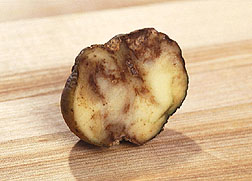This page has been archived and is being provided for reference purposes only. The page is no longer being updated, and therefore, links on the page may be invalid.
|
Read the magazine story to find out more. |
Wild Potato's Gene May Protect Vulnerable SpudsBy Marcia WoodAugust 9, 2004 America's favorite veggie--the potato--sometimes falls victim to its worst enemy, a disease called late blight. But Agricultural Research Service scientists have found a promising gene that might help. Isolated from a wild Mexican potato, Solanum bulbocastanum, the novel Sbul1 gene may work in concert with other genes to boost the ability of popular, domesticated S. tuberosum tubers to shrug off attacks by the fungus-like microbe, Phytophthora infestans, that causes late blight. A team led by ARS plant physiologist William R. Belknap at the Western Regional Research Center at Albany, Calif., identified the Sbul1 gene, following earlier research by John P. Helgeson, formerly with ARS at Madison, Wis. Helgeson had fused S. bulbocastanum with S. tuberosum potatoes. Then, ARS researchers at Aberdeen, Idaho, used samples of these potatoes to develop new, experimental tubers that they provided to Belknap. Each time they crossed, or "hybridized," the Wisconsin potatoes with other tubers, the Idaho team lessened the amount of genetic material from the wild potato--narrowing the California team's search for the resistance gene. At Albany, researchers isolated and copied the Sbul1 gene from one of the Aberdeen potatoes, then moved the gene into domesticated potatoes for tests in the specialized greenhouses of ARS plant pathologist Kenneth L. Deahl in Beltsville, Md. The California group also determined the blueprint, or structure, of the Sbul1 gene and pinned down its location within the wild potato's genome. Deahl's greenhouse tests of the Sbul1-enhanced tubers are being succeeded by outdoor trials in the Midwest. Read more about the research in the August issue of Agricultural Research magazine. ARS is the U.S. Department of Agriculture's chief scientific research agency. |

